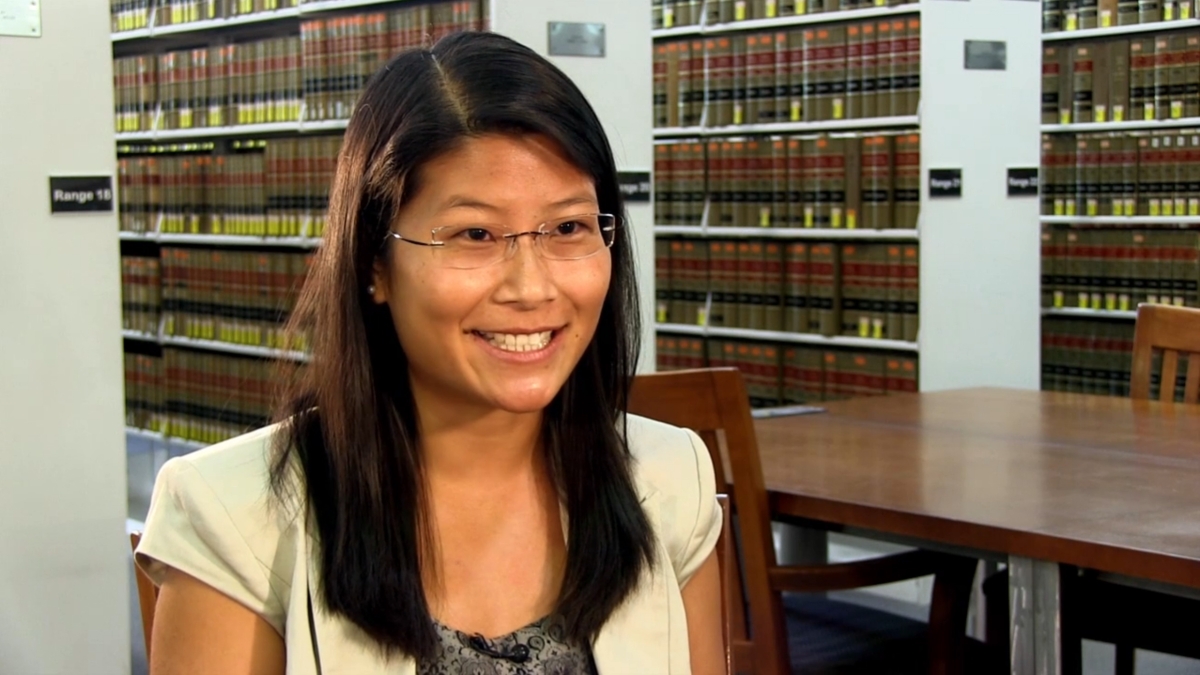Student takes on medicine, law in Mayo-ASU program

As a young girl growing up in Southeastern Asia, Ma Khin Pyi Son often pondered her future. She had a special aptitude in math and science, and her family, including an aunt who was a physician in the United States, thought medicine was an ideal career path.
Pyi Son also considered a degree in law, but chose not to pursue it.
Now, thanks to a unique collaboration between Mayo Medical School and Arizona State University, Pyi Son is studying both fields. She’s among four students currently enrolled in the M.D./J.D. dual-degree program, which requires two years of medical school at Mayo, two years of law courses at ASU’s Sandra Day O’Connor College of Law, then two final years of medical school. At the end of the six years, Pyi Son will have degrees in medicine and law.
The first M.D./J.D. student, Brian Wilhelmi, earned his Juris Doctor in 2007, and since then, seven others have graduated from the program. Pyi Son and three other M.D./J.D. students are slated to graduate from law school in May 2014.
“The big draw for me was the fact that I could do the (law) degree in two years instead of three. They said, `You’re just squeezing the syllabus into five semesters instead of six.’ That made it a lot more doable for me.”
The Burma-born Pyi Son was raised in Singapore and migrated to the United States in 2004 to study at United World College of the American West, an international baccalaureate school outside Las Vegas, N.M. She graduated from Williams College in northwestern Massachusetts with a bachelor's in biology, magna cum laude.
“I was a little bit of a science geek growing up and I must have been influenced by the British education system which, especially in Singapore, heavily emphasizes science and math. I took triple science and double maths in secondary school.”
Pyi Son was thrilled to be accepted by Mayo and began her classes on the Rochester, Minn. campus in 2010. Medical school has been different from her expectations.
“People usually think medical students never see the light of day – and that might have been true during anatomy class – but Mayo has a very strong emphasis on allowing us to have a life. They also emphasize some of the clinical experiences from the very beginning. So, instead of having just classroom sessions the first two years, they have us see patients and train clinically, too.”
For Pyi Son, the most enjoyable part of medical school has been the electives – two-week sessions between the traditional six-week courses in which students customize their learning.
“Mayo wants us to control some of our education, so after three weeks of classroom experiences, we shadow a physician in any field that we like, do a research program, or travel to another part of the country or the world to experience a different kind of medical care.”
Pyi Son has done research with Brian Mohney, a pediatric ophthalmologist, about whether the clinical treatment of childhood eye disorders and refractive errors might be improved.
She also has embraced community work. She has promoted awareness and advocacy of human rights issues on campus and in Rochester, helped patients at a free student-run clinic, collaborated with other students and organizations to create a program coordinating medical care for victims of human trafficking, and was involved with organized medicine at the county, state and national levels.
During her first semester of law school, in the fall of 2012, Pyi Son started doing pro bono work in Phoenix. She has assisted attorneys in providing legal advice to the homeless, mentored middle school students interested in legal or medical careers, and raised awareness among fellow law students about practicing across national borders.
“It’s been good just to see how attorneys who don’t work in those fields approach their pro bono work. That is quite different from medicine because you can’t volunteer as a gastroenterologist and advise somebody on their cardiac problems.”
Pyi Son, who plans to practice medicine in a yet-to-be-determined field, said she is interested in the human rights aspects that overlap medical care and legal issues of patients. Her courses in the fall include Domestic Violence and the Law, International Human Rights, and Immigration Law, in addition to an externship at the Office of the Legal Defender. She also is a scholar in the College of Law’s Center for Law, Science & Innovation.
“Learning about the law has opened my eyes in terms of what’s in the news, and helped me understand the policies of Congress and the rulings of the U.S. Supreme Court.”
Armed with a Juris Doctor next spring, Pyi Son will return to Rochester, Minn. for two years of clinical rotations, then graduate in spring 2016. She would recommend the Mayo-ASU M.D./J.D. program to anyone interested in the important and numerous intersections of medicine and law.
“It’s a great way to get an understanding of how policies and the structures of our society work.”